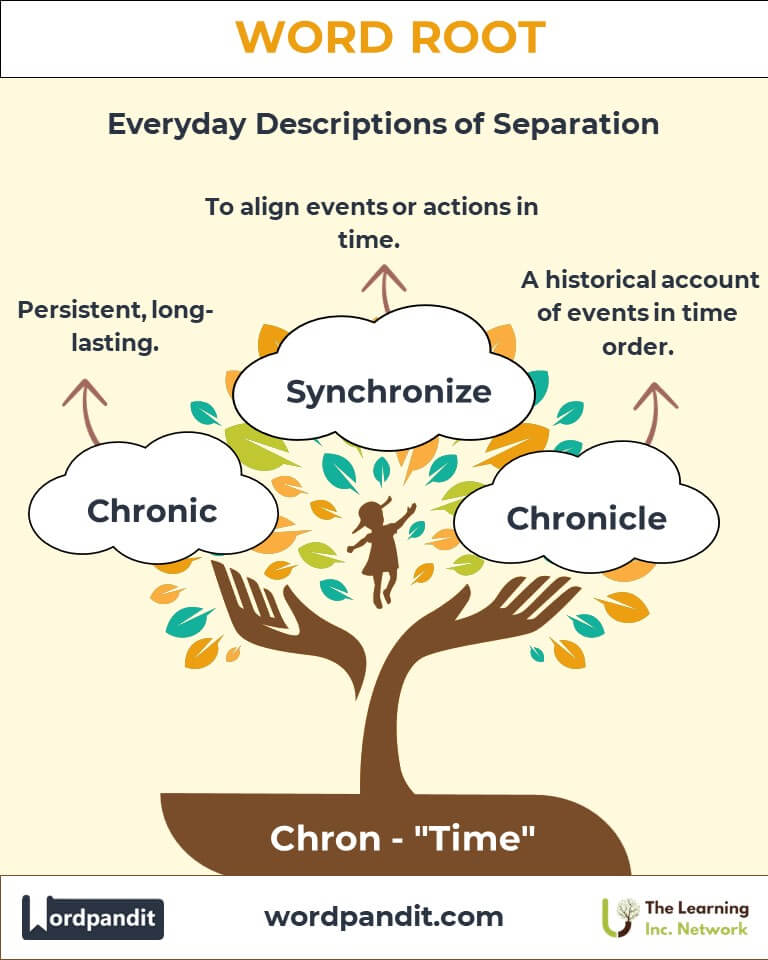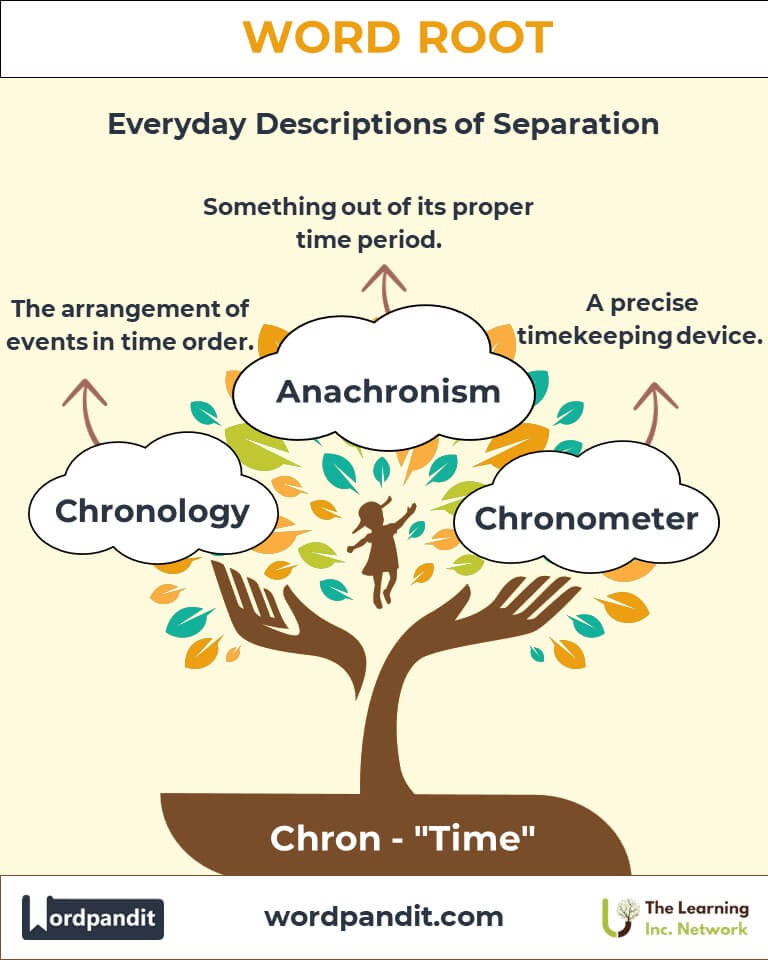Chron: The Root of Time in Language and Culture
Discover the fascinating world of the root "chron," meaning time. From chronic conditions to synchronized movements, this Greek root has shaped countless words and concepts across disciplines, connecting us to the essence of time itself.

Table of Contents
- Introduction: The Significance of "Chron"
- Etymology and Historical Journey
- Mnemonic: Unlocking the Power of "Chron"
- Common "Chron"-Related Terms
- "Chron" Through Time
- "Chron" in Specialized Fields
- Illustrative Story: "Chron" in Action
- Cultural Significance of "Chron"
- The "Chron" Family Tree
- FAQs about the "Chron" Word Root
- Test Your Knowledge: "Chron" Mastery Quiz
- Conclusion: The Everlasting Influence of "Chron"
1. Introduction: The Significance of "Chron"
What connects a chronic illness, a synchronized dance, and a timeline? The answer lies in the root "chron," derived from the Greek word khronos (time). Pronounced "kron," this root provides a linguistic foundation for terms spanning history, science, and everyday life. Whether marking perpetual conditions or harmonious timing, "chron" reminds us of time's profound influence on human experience.

2. Etymology and Historical Journey
The root "chron" originates from the Greek khronos, meaning time. Ancient Greeks, fascinated by the passage of time, used this term in mythology, philosophy, and science. Over centuries, "chron" entered Latin, then Old French, and finally English, carrying its temporal essence into words like "chronic" and "chronicle." Its journey reflects humanity's enduring obsession with measuring and understanding time.
3. Mnemonic: Unlocking the Power of "Chron"
Imagine a ticking clock labeled "CHRON," marking every second of a timeline stretching into the past and future. This visualization ties "chron" to the concept of time.
Mnemonic Device: “Chron keeps track of time—from chronic problems to synchronized dances.”
4. Common "Chron"-Related Terms
- Chronic (kron-ik): Persistent, long-lasting.
Example: "Her chronic back pain required ongoing treatment." - Synchronize (sin-kruh-nize): To align events or actions in time.
Example: "The swimmers synchronized their movements perfectly during the routine." - Chronicle (kron-i-kuhl): A historical account of events in time order.
Example: "The book chronicles the rise and fall of the ancient empire." - Chronology (kruh-nol-uh-jee): The arrangement of events in time order.
Example: "The historian carefully constructed the chronology of the war." - Anachronism (uh-nak-ruh-niz-uhm): Something out of its proper time period.
Example: "The film's use of a smartphone in a medieval setting was a glaring anachronism."
5. "Chron" Through Time
- Chronic (Ancient): Originating in medical texts, it described long-lasting conditions.
Shift: Expanded to describe enduring social or personal issues. - Anachronism (Renaissance): Once a term for errors in historical works, it became a literary device to highlight contrasts between eras.
6. "Chron" in Specialized Fields
- Medicine:
Chronic: Refers to diseases or conditions persisting over time.
Example: Chronic illnesses like diabetes require long-term care. - Technology:
Synchronized Systems: Essential for communication networks and digital devices.
Example: Servers synchronize time to ensure accurate data transfers. - History:
Chronicles: Provide detailed accounts of historical events.
Example: Chronicles like those of Froissart offer insights into medieval life.
7. Illustrative Story: "Chron" in Action
In a bustling city, Mia, a historian, uncovered an old chronicle detailing her ancestors' lives. Meanwhile, her tech-savvy brother synchronized their family tree app to add the newfound details. Their work bridged centuries, showing how "chron" connects the past to the present through time's unyielding thread.
8. Cultural Significance of "Chron"
"Chron" is deeply embedded in human culture. From Chronos, the Greek personification of time, to modern devices like chronometers, this root reflects our fascination with tracking and mastering time. Phrases like "chronicling history" and "perfect synchronization" highlight its enduring impact.

9. The "Chron" Family Tree
- Temp (Latin: Time):
- Temporary: Lasting a short time.
- Temporal: Related to worldly time.
- Meter (Greek: Measure):
- Chronometer: A precise timekeeping device.
- Dur (Latin: Hard, enduring):
- Duration: The length of time something lasts.

10. FAQs About the "Chron" Word Root
Q: What does "chron" mean?
A: "Chron" means "time," derived from the Greek root khronos. It forms the foundation of many English words related to time, such as "chronic" (lasting over time) and "synchronize" (aligning actions in time).
Q: What is a chronicle?
A: A chronicle is a detailed account of events arranged in the order they occurred. Historians and writers use chronicles to document significant happenings across timelines, preserving history for future generations.
Q: How is "synchronize" used in daily life?
A: Synchronize means to align actions or events in time. It’s used in various contexts, such as setting clocks to the same time, coordinating dance movements, or ensuring devices communicate simultaneously in technology.
Q: What does "chronic" describe?
A: "Chronic" refers to something that persists for a long time, often with a negative connotation. In medicine, it describes long-lasting conditions like chronic pain. In broader contexts, it can refer to recurring problems, such as a chronic habit of being late.
Q: What is an anachronism?
A: An anachronism is something misplaced in time, often appearing in the wrong era. For instance, depicting a modern gadget in a movie set in the Middle Ages is an example of an anachronism.
Q: What is the significance of "chron" in technology?
A: In technology, "chron" is essential for maintaining synchronization in systems. Devices, servers, and even online meetings rely on synchronized clocks to function correctly. Concepts like chronometers ensure precision in timekeeping.
Q: How does "chron" relate to history?
A: Words like "chronology" (the sequence of events in time) and "chronicling" (documenting historical accounts) stem from the root "chron," emphasizing its importance in organizing and understanding historical events.
Q: What does "chronometer" mean, and where is it used?
A: A chronometer is a highly accurate timekeeping instrument. It’s commonly used in navigation and horology to measure precise time intervals, crucial for tasks like celestial navigation or scientific experiments.
11. Test Your Knowledge: "Chron" Mastery Quiz
1. What does "chron" mean?
2. What is a chronic condition?
3. Which term describes aligning actions in time?
4. What tool measures time with great precision?
5. What is an anachronism?
12. Conclusion: The Everlasting Influence of "Chron"
The root "chron" weaves through language, connecting fields like medicine, history, and technology. As we continue to explore time's mysteries, this root remains a vital link to our temporal experiences. Whether chronicling history or synchronizing systems, "chron" keeps us anchored in the flow of time.














